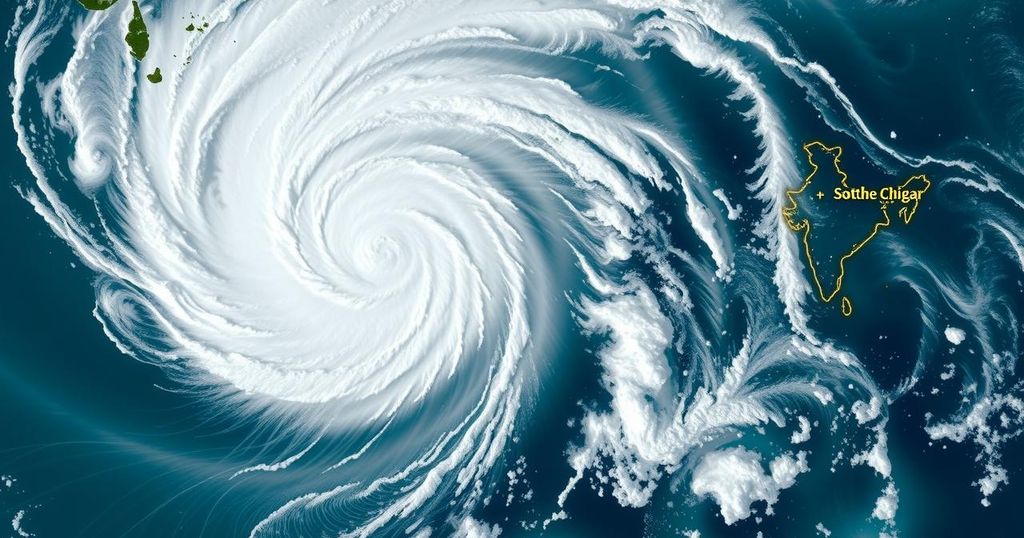Emergency Appeal for Tropical Cyclone Chido in the Southwest Indian Ocean
Tropical Cyclone Chido significantly impacted the Southwest Indian Ocean, reaching category 4 with winds of 220 km/h. As of December 22, the cyclone resulted in 142 deaths and over 3,300 injuries, primarily affecting Madagascar, Mozambique, Mayotte, and Malawi. Extensive damage to infrastructure and agriculture has been reported, necessitating urgent humanitarian assistance and disaster management efforts.
Tropical Cyclone Chido has made a devastating impact on the Southwest Indian Ocean, marking the onset of an early and unusually severe cyclone season. On December 11, Chido escalated to an intense tropical cyclone of category 4, with sustained winds of 220 km/h and gusts reaching 250 km/h. As of December 22, the cyclone has led to at least 142 confirmed fatalities—94 in Mozambique, 35 in Mayotte, and 13 in Malawi—alongside more than 3,300 reported injuries.
The cyclone first affected Madagascar, where almost 136,000 individuals were projected to face adverse effects. The storm severely damaged infrastructure, and heavy rainfall resulted in significant flooding and crop losses. Collaborating with the Malagasy Red Cross, local authorities issued warnings and executed evacuations for at-risk populations.
In reaction to the cyclone’s devastation, the government of Comoros declared a week of mourning, acknowledging the plight of 64,167 individuals impacted in Anjouan and Moheli, with 171 families rendered homeless. Significant damages were inflicted upon schools and residential structures, with approximately 45 percent of agricultural yields affected.
Mayotte experienced extensive destruction as approximately 70 percent of its populace—around 230,000 people—were severely impacted. The cyclone obliterated about 35,000 houses and damaged critical facilities, including the main hospital and airport, which has disrupted essential services. Currently, around 100,000 individuals are seeking shelter in accommodation centers lacking adequate provisions of food, water, and hygiene.
In Mozambique, the cyclone affected roughly 622,000 citizens, notably in the province of Cabo Delgado, where over half a million individuals faced severe infrastructural damage. The cyclone led to more than 130,000 shelters being damaged or destroyed, exacerbating existing vulnerabilities in the region’s communities.
Malawi has reported nearly 45,000 individuals stranded due to the cyclone’s remnants, which further illustrates the pressing requirement for ongoing humanitarian efforts and disaster management support.
Ongoing assessments aim to determine the full extent of the damage across these regions. The National Societies of the Red Cross and Red Crescent remain actively involved, conducting search and rescue operations, providing first aid, and assisting in family reunifications and relocations. This Emergency Appeal emphasizes the essential need for preparedness and resilience against increasingly severe tropical storms, seeking resources to support humanitarian assistance and strengthen community resilience through the remaining cyclone season.
Tropical Cyclone Chido emerged as the inaugural cyclone of the season, significantly affecting several countries in the Southwest Indian Ocean, including Madagascar, Mozambique, Mayotte, and Malawi. Forecasts had anticipated an early and active cyclone season, thereby heightening concerns regarding potential impacts, particularly in vulnerable regions such as the Mascarene Islands and eastern African coastlines. By gathering detailed reports of the cyclone’s effects, humanitarian agencies can better respond and implement necessary support mechanisms for communities in distress.
In conclusion, Tropical Cyclone Chido has wreaked considerable havoc across the Southwest Indian Ocean, with tragic loss of life and extensive damage to infrastructure and agriculture. The emergency response is critical, as local authorities and humanitarian agencies work tirelessly to assist afflicted populations. Enhancing preparedness and community resilience will be vital in mitigating the impacts of future cyclones, as highlighted by the overwhelming data from the cyclone’s aftermath.
Original Source: reliefweb.int




Post Comment